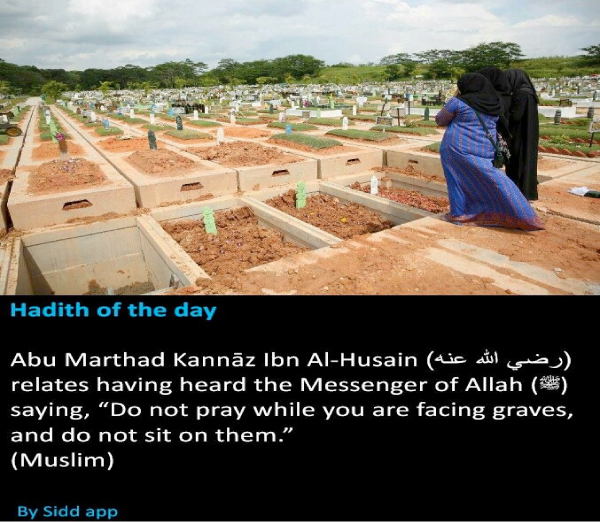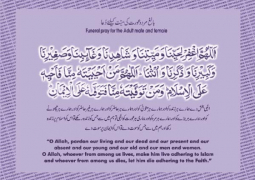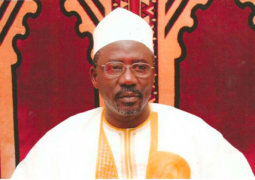
(Muslim, Ahmad, and the Sunan works) They were prohibited from visiting the graves because of their proximity to the Jahiliyyah (Days of Ignorance) when they used incorrect and obscene language. After they had fully entered the fold of Islam, became well pleased with it, and had fully accepted its laws, the Prophet, peace be upon him, permitted them to visit graves. Abu Hurairah reported: “The Prophet, peace be upon him, visited his mother’s grave and cried, and everyone there cried with him. Then the Prophet, peace be upon him, said: ‘I sought my Lord’s permission to seek forgiveness for her, but He did not permit me. I then sought permission to visit her grave and He permitted me to do this. You should visit graves, because they will remind you of the reality of death.’’ (Muslim, Ahmad, and the Sunan, except Tirmizhi) Since the purpose of visiting graves is admonition and remembrance of death, it is permissible to visit the graves of disbelievers. Weeping when passing by the graves of the wrongdoers who were seized and punished by Allah for their evil deeds, and to express one’s humility and one’s need for forgiveness of Allah is desirable. This is obvious from a hadith, reported by Bukhari on the authority of Ibn ‘Umar, that the Prophet, peace be upon him, said to his Companions, when they passed through Al-Hijr, the dwellings of the people of Thamud, “Do not go without weeping to the places of burial of those who are undergoing torment. But if you cannot weep, then do not enter these places lest what befell them should befall you.”
Etiquette of Visiting Graves
Whoever pays a visit to a grave should face the deceased, greet him, and supplicate for him. On this subject we find the following: Buraidah reported: “The Prophet, peace be upon him, taught us that when we visited graves we should say, ‘Peace be upon you, O believing men and women, O dwellers of this place. Certainly, Allah willing, we will join you. You have preceded us and we are to follow you. We supplicate to Allah to grant us and you security’.’’ (Reported by Muslim, Ahmad, and others) Ibn ‘Abbas reported: “Once the Prophet, peace be upon him, passed by graves in Madinah. He turned his face toward them saying: ‘Peace be upon you, O dwellers of these graves. May Allah forgive us and you. You have preceded us, and we are following your trail’.” (Tirmizhi) ‘Aishah said: “Every time it was my turn to be with the Prophet, peace be upon him, toward the end of the night, he would go out to the cemetery of al-Baqi’ and would say, ‘Peace be upon you, O abode of believers. What you were promised will come to pass tomorrow at a fixed time. We shall, Allah willing, soon join you. O Allah! Grant forgiveness to the people who are buried in al-Baqi’ al-Gharqad’,’ (Muslim) ‘Aisha also reported: “I asked: ‘what should I say when I pass by a graveyard, O Messenger of Allah?’ He replied, ‘Say, “Peace be upon the believing men and women dwelling here. May Allah grant mercy to those who have preceded us and those who are to follow them. Certainly, Allah willing, we will join you”’.” What some people do, like wiping hands over the graves and tombs, kissing them, and circumambulating around them are abominable innovations. Such things should not be done, for they are unlawful. These things are permissible, however, if performed in relation with the House of Allah, the Ka’abah, for Allah has so honored it. The grave of the Prophet, peace be upon him, cannot be considered a similar case, nor the tomb of a saint. All good comes from adherence to his example whereas all evil flows from innovating new things in religion. Ibn al-Qayyim said: “The Prophet, peace be upon him, visited the graves to supplicate for their inhabitants, and to seek mercy and forgiveness of Allah for them. Contrary to this, the pagans supplicated to the dead, swearing by them, asking them for their needs, and seeking their support and help. Such pagan practices are in conflict with the guidance of the Prophet, peace be upon him, and his teachings about the Oneness of Allah and about the manner of supplicating for Allah’s mercy for the dead. The people who do such things are guilty of polytheism; they are indulging in sin, and bringing evil to the deceased. They may be divided into three categories: those who supplicate for the deceased, those who supplicate through the deceased, and the third who supplicate to the deceased. They think that making supplications by a grave is better than in a mosque. For anyone who looks to the guidance of the Messenger of Allah, peace be upon him, and his Companions, the distinction between the two cited positions is fairly obvious.”
Can Women Visit Graves
Imam Malik and some Hanafi scholars, and, according to one report from Ahmad, most of the scholars hold it permissible for women to visit graves. This is based on the following hadith from ‘Aishah, “What should I say to them, O Messenger of Allah when visiting graves?” As mentioned above Abdallah ibn Abi Mulaikah is also reported to have said, “Once ‘Aishah returned after visiting the graveyard. I asked, ‘O Mother of the Believers, where have you been?’ She said: ‘I went out to visit the grave of my brother Abd ar-Rahman.’ I asked her: ‘Didn’t the Messenger of Allah, peace be upon him, prohibit visiting graves?’ She said, ‘Yes, he did forbid visiting graves during the early days, but later on he ordered us to visit them’.” This is reported by Al-Hakim and Al-Baihaqi, who also remarked that this hadith was narrated only by Bistam bin Muslim al-Basri. Azh-Zhahabi said that it is a sound hadith. Anas reported: “The Prophet, peace be upon him, saw a woman crying by the grave of her son, and said to her, ‘Fear Allah, and be patient.’ She replied, ‘What do you care about my tragedy?’ When he went away, someone told her, ‘Indeed, that was the Messenger of Allah, peace be upon him. ‘The woman felt extremely sorry and she immediately went to the Prophet’s house, where she did not find any guards. She called out: ‘O Messenger of Allah! I did not recognize you.’ The Prophet, peace be upon him, said, ‘Verily patience is needed at the time of the first affliction’.’’ (Bukhari and Muslim) This supports the argument in favor of the permissibility of women visiting graves, for the Prophet, peace be upon him, saw her at the grave and did not show his disapproval of it. The purpose of visiting graves is to remember the Hereafter, which is something that both men and women need. Men are by no means more in need of this reminder than women. Some scholars disliked it for women to visit graves as they are less patient and too emotional. The Prophet, peace be upon him, said, “May Allah curse the women who are frequent visitors of the graves.” (Reported by Ahmad, Ibn Majah, and Tirmizhi, who said that it is a sound hadith) Al-Qurtubi said: “The curse mentioned in this hadith applies only to those women who visit graves frequently. The reason for this curse lies perhaps in the fact that it involves infringement of the rights of the husband, and leads to adornment and exhibition of their beauty to strangers, and shouting, yelling, and other similar things.” It may be said that, “If no such harm is feared from women visiting graves, then there is no valid reason for preventing them from visiting graves, for indeed remembrance of death is something that both men and women equally need.” Commenting on Al-Qurtubi’s view, Ash-hawkani said, “This statement may form the basis for reconciling apparently contradictory hadith.”
The Deeds that Benefit the Departed Souls and Proffering Reward for Good Deeds to the Messenger of Allah (peace be upon him)
There is consensus that a deceased person benefits from all good deeds for which he or she in his or her life might have been a cause. Abu Hurairah reported, “The Prophet, peace be upon him, said, ‘When a person dies all his good deeds cease except for three: a continuous act of charity, beneficial knowledge, and a righteous son who prays for him’.’’ (Muslim and the Sunan) Also Abu Hurairah reported, “The Prophet, peace be upon him, said, ‘The righteous works that continue to benefit a believer after his death include the knowledge that he taught and spread among others, a righteous son whom he leaves behind, or a copy of the Qur’an that he bequeaths to his inheritors, or a mosque that he builds, or a rest house that he builds for the wayfarers, or a canal of water that he digs for the benefit of others, or a charity that he gives out of his property during his life while he is sound of health. He will continue to receive reward for all these even after his death.’ (Ibn Majah) Jarir ibn Abdallah reported: “The Prophet, peace be upon him, said: ‘Whoever introduces a good practice in Islam will get its reward and the rewards for all those who follow these practices after him, without any loss to their reward. And whoever introduces a bad practice in Islam will acquire its sin and the sins of all those who practice it, without any decrease in their sins.”
An account of the righteous deeds performed by others that continue to be beneficial to the deceased is given in detail below:
- Charity. An-Nawawi has recorded that Muslim scholars agree that charity benefits the deceased person and its reward reaches the deceased whether it is given by his or own son or by someone else. This is based on a report from Ahmad, Muslim, and others from Abu Hurairah that, “A man said to the Prophet, peace be upon him, ‘ My father died leaving wealth but no will. Would he be pardoned if we gave charity on his behalf?’ He said: ‘Yes.”’ It is also reported from Al-Hasan from Sa’d ibn ‘Ubadah that “his mother died and he said, ‘O Messenger of Allah, my mother has died. Should I give charity on her behalf?’ He said: ‘Yes.’ I said: ‘What is the best charity?’ He said, ‘Offering people a drink of water’.” AlHasan said: “This is the drinking place of the family of Sa’d in Madinah.” This is reported by Ahmad, Nasa’i, and others. Giving charity in the graveyard is not permissible and giving it during the funeral is disliked.
- Fasting. This is based on a report by Bukhari and Muslim from Ibn ‘Abbas who said, “A man came to the Prophet, peace be upon him, and said, ‘My mother has died without making up for a missed month of fasting. Can I fast on her behalf? ‘ The Prophet, peace be upon him, said, ‘ Would you pay her debt if she owed someone?’ The man said, ‘Yes.’ The Prophet, peace be upon him, said, ‘Allah is more deserving of payment in settlement of His debt’.”
- Performing the Pilgrimage (Hajj). This is based on a report by Bukhari from Ibn ‘Abbas that “a woman of the Juhainah tribe came to the Prophet, peace be upon him, and said, ‘My mother had vowed to perform pilgrimage, but she died before she could fulfill her vow. Should I do it on her behalf?’ The Prophet, peace be upon him, said, ‘Yes. Perform Hajj on her behalf. Would you not pay the debt of your mother if she had owed someone? Fulfill it. Allah is more deserving of receiving payment for what is due to Him’.”
- Prayer (Salah). This is based on a report by Ad-Darqutni who said that “a man asked, ‘O Allah’s Messenger! I had parents whom I served while they lived. How can I be good to them after their death? ‘ The Prophet, peace be upon him, said, ‘Verily, among the good deeds that you can do after their death is to offer prayer (Salah) for them when you pray for yourself and to fast for them when you fast for yourself’.”
- Recitation of the Qur’an. This is beneficial to the deceased according to the opinion of the majority of the scholars among the ahl al-sunnah. An-Nawawi said, “The most well-known position of the Shafi’i school is that this does not benefit the deceased.” Ahmad ibn Hanbal and a group of Shafi’ i scholars hold that it does benefit the deceased. The reciter has an option. He may supplicate for the deceased to be rewarded for the recitation, saying: “O Allah! Grant the reward of what I recited to so-and-so.” Ibn Qudamah in al-Mughni stated, “Ahmad ibn Hanbal said, ‘The deceased will receive the reward for every good done on his behalf. This is proved by textual evidence found on this subject. The fact that Muslims in every city gather to recite the Qur’an for the benefit of the deceased and that they have been doing so without any disagreement or disapproval show that there is consensus on this subject’.” Those who hold that the deceased benefits by the recitation of others make it conditional upon the reciter not to accept any payment for his recitation. If the reciter is paid for reciting, it is unlawful for both the giver and the receiver, and he shall have no reward for his reciting. Abd Ar Rahman ibn Shibl reported that the Prophet, peace be upon him, said, “Recite the Qur’an, and do good deeds .... Do not neglect it, nor be extreme in it. Do not make it a means of living nor a source of your wealth.’’ (Reported by Ahmad, At-Tabarani, and Al-Baihaqi) Ibn al-Qayyim said, “Worship is of two types: financial and physical. The Prophet, peace be upon him, has informed us that because charity (sadaqah) benefits the deceased, all other acts of charity will also benefit the deceased, and that because fasting on his behalf benefits the deceased, all other physical acts of worship will likewise benefit the deceased. Similarly the Prophet, peace be upon him, informed us that the reward of making Hajj, which involves both physical and financial sacrifice, does indeed benefit the deceased. Thus these three types of beneficial acts of worship are supported by both the revealed texts and reason.
Intention as a Prerequisite
The performer must have the intention of performing an act on behalf of the deceased. Ibn ‘Aqil said, “If one performed any act of obedience, for example, a prayer, fasting, or recitation of the Qur’an and made its reward a gift to a deceased Muslim, the deceased will receive the reward for it, provided that he has a prior intention of making it for the benefit of the deceased, and the act and the intention go together.” Ibn al-Qayyim supports this opinion.
The Best Present for the Deceased
Ibn al-Qayyim said, “The best present for the deceased is an act that is most beneficial to people, for example, freeing a slave. Thus a sadaqah giving in charity is better than fasting on behalf of the deceased. The best charity is that which fulfills someone’s need and is continuous. The Prophet, peace be upon him, said, “The best charity is to give people a drink of water.” This applies to a place where water is scarce. Otherwise, giving someone a drink of water from a river or a canal would not be better than feeding the hungry who need food. Likewise, supplication and asking forgiveness for the deceased is beneficial to the deceased, especially when the supplicant is sincere, earnest, and humble in his supplication. Such a supplication is better than charity, just as regular prayer (Salah) is better than the funeral prayer and then supplicating for the deceased by his grave. In general, the best gift to send the deceased is freeing a slave, giving in charity, asking forgiveness for him or her, and making the Hajj (pilgrimage) on his or her behalf.
Presenting a Reward to Allah’s Messenger (pbuh)
Ibn al-Qayyim said, “Some of the latter jurists hold it desirable while others do not agree because they regard it as an innovation (bid’ah). The Companions never did it. The Prophet, peace be upon him, shall receive a reward for every good done by anyone from among his community (Ummah) without in the least diminishing the reward of the doer. This is because he is the one who invited his community to every good, and led them to it, and because the one who calls others to truth always has a reward similar to that of those who follow it without in any way diminishing their reward. Whatever guidance or knowledge his community gained, they gained it only through him, so he shall have a reward equal to that of his followers whether they formally dedicate it to him or not.
To be continued





